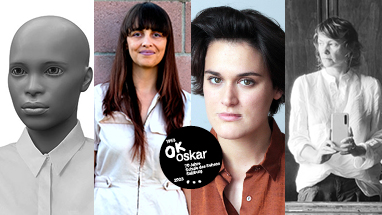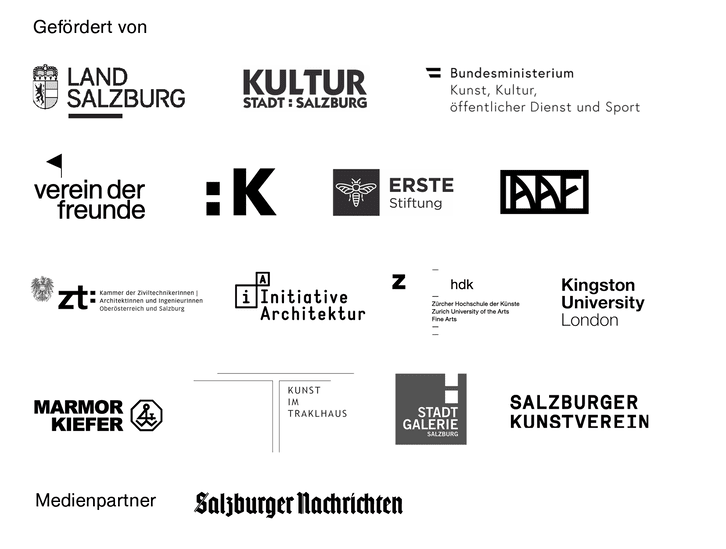| Shop |
- Academy
- Studies
- Courses
- – Courses 2024
- – All courses
- – Painting
- – Drawing
- – Printmaking
- – Photography / Film / Video
- – Sculpture
- – Installation
- – Performance
- – Architecture
- – Art Critique / Writing
- – Curating
- – Course archive 2023
- – Course archive 2022
- – Course archive 2021
- – Course archive 2020
- – Course archive 2019
- – Course archive 2018
- – Courses until 2017
- Events
- Blog/Videos
- Press

Shu Lea Cheang, Sarah Ciston, Ariana Dongus, Magda Tyzlik-Carver and Matteo Pasquinelli

Seventy years after founding the "School of Vision", the symposium asks how machine vision affects our sense of sight. The expansion of human creativity, support of perception, and production of new images, texts and sounds: artificial intelligence is currently being discussed socially with its possibilities and shortcomings. In the process, a fear of taking over human abilities and tasks is very present and associated with this is a one-sided pejorative portrayal of techno-political contexts. Suppose AI is seen as a possible tool in a world riddled with crises. In that case, new connections between technology and critical materialism emerge that also question seeing and, thus, possible world views. The symposium investigates creative and exploratory processes from the artistic perspective: How do we capture the technological co-evolution of perception and creativity? What concept of art do these developments bring forth?
With Shu Lea Cheang (artist, Taiwan/France), Sarah Ciston (Mellon PhD Fellow Media Arts and Practice, University of Southern California and artist, US), Ariana Dongus (media scientist and AI researcher, Germany), Magda Tyzlik-Carver (Associate Professor of Digital Communication and Culture, Aarhus University, Denmark) and Matteo Pasquinelli (Professor of Media Philosophy at Karlsruhe University of Art and Design).
Programme
2 pm Welcome
Sophie Goltz (Director, Summer Academy Salzburg) and Maximilian Lehner (Assoc Curator, Summer Academy Salzburg)
2:30 pm Biases in Artificial Intelligence
Sarah Ciston (Mellon PhD Fellow Media Arts and Practice, University of Southern California, artist, USA) and Ariana Dongus (media scientist, researcher, Germany)
3:30 pm Future of artificial intelligence and data
Shu Lea Cheang (artist, Taiwan/France) in a talk with Magda Tyzlik-Carver (Assoc Prof Digital Communication and Culture, Aarhus University, Denmark)
4:30 pm Pause
5 pm What Kind of Intelligence is Artificial Intelligence? Towards a Sociogenic Theory of Automation
Matteo Pasquinelli (Prof Media Theory, Karlsruhe University of Arts and Design, Germany)
Shu Lea Cheang “My work aims to re-envision genders, genres, and operating structures. My genre‑bending, gender‑hacking practices challenge the existing operating mechanisms and society’s structural boundaries. I build social interface with transgressive plots and open network that permits public participation; I construct networked installation and multi-player performance in participatory impromptu mode; I draft sci-fi narratives in film scenario and artwork imagination. I seek to define a genre of new queer sci-fi cinema.”
Sarah Ciston (they/them) builds critical–creative tools to bring Intersectional approaches to machine learning. Recently named AI Newcomer by the German Informatics Society, they are an AI Anarchies Fellow with the Akademie der Künste, a Mellon Fellow in Media Arts and Practice at the University of Southern California, and an Associated Researcher at the Humboldt Institute for Internet and Society, plus author of A Critical Field Guide to Working with Machine Learning Datasets from the Knowing Machines research project. Sarah’s projects include an interactive NLP database to "rewrite" the inner critic and a bot that tries to explain feminism to online misogynists. They lead Creative Code Collective, a student community for co-learning programming using approachable, interdisciplinary strategies.
Ariana Dongus is a researcher in the field of critical artificial intelligence. Since July 23 Research Fellow at the Chair of Digital Cultures with Prof. Halpern. In 2021, she was named an AI Newcomer by the German Federal Ministry of Education and the German Informatics Society. Until this summer, she coordinated the KIM research group at HfG, founded by Prof. Pasquinelli. By exploring the intersection of biometrics, colonial pasts, new forms of labour and machine "intelligence", she contributes to a critique of today's digital economies. She has given workshops and lectures at home and abroad, e.g. at Ars Electronica, transmediale, PACT Zollverein, Bern University of the Arts, Shanghai Ming Contemporary Art Museum, the Ljubljana Biennale of Graphic Arts, the European Media Art Festival, Haus der Kunst Munich or the Goethe Institute Montreal.
Magdalena Tyżlik-Carver is curator, researcher and theorist who engages the concept of posthuman curating to inquire into how computational culture and data impact daily practices of living. Her current research in the projects Fermenting Data and Curating Data focus on developing participatory methods for data practices beyond BigTech extractivism and expansive infrastructural politics, while also looking at the ways in which knowledge practices and systems are co-developed. In her teaching and research she draws on trans*feminist values and approaches to address who has access to technology and data and on what conditions. Her recent curatorial projects include exhibitions Fermenting Data: Aarhus 8000-8220 (2021) and Screenshots: Desire and Automated Image (2019). Magdalena is an Associate Professor of Digital Communication and Culture in the Dept. of Digital Design and Information Studies at Aarhus University and Associate Researcher in the Centre for the Study of the Network Image in London South Bank University.
Matteo Pasquinelli is Professor of Media Philosophy at the University of Arts and Design Karlsruhe. He is the author of The Eye of the Master: A Social History of Artificial Intelligence (Verso Books, 2023). He is also the recipient of the ERC Consolidator Grant AIMODELS.
Internationale
Sommerakademie
für bildende Kunst
Salzburg
T +43 662 842113
| Folgen Sie uns: Newsletter TikTok YouTube |
| © 2023 / Impressum / Datenschutz |
